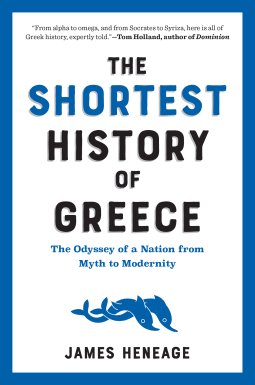
The Shortest History of Greece
The Odyssey of a Nation from Myth to Modernity
by James Heneage
This title was previously available on NetGalley and is now archived.
Send NetGalley books directly to your Kindle or Kindle app
1
To read on a Kindle or Kindle app, please add kindle@netgalley.com as an approved email address to receive files in your Amazon account. Click here for step-by-step instructions.
2
Also find your Kindle email address within your Amazon account, and enter it here.
Pub Date Mar 21 2023 | Archive Date Mar 20 2023
Talking about this book? Use #TheShortestHistoryofGreece #NetGalley. More hashtag tips!
Description
Philosophy, art, democracy, language, even computers—the glories of Greek civilization have shaped our world even more profoundly than we realize. Pericles and the Parthenon may be familiar, but what of Epaminondas, the Theban general who saved the Greek world from Spartan tyranny? Alexander the Great’s fame has rolled down the centuries, but the golden Hellenistic Age that followed is largely forgotten. “Byzantine” conjures decadence and deadly intrigue, yet the thousand-year empire that ruled from Constantinople and saved Europe twice from invasion was, in fact, Greek.
Greece’s modern chapter, too, tells of triumph and calamity—from liberation and expansion to schism, homegrown dictatorship, Nazi occupation, and civil war. Today’s nation is battered by austerity, encroaching climate change, and a refugee crisis—yet unwavering in its ancient values.
James Heneage captures the full Grecian drama in this riveting, short history, revealing Greece as the wellspring of Western civilization—and a model that may yet save modern democracy.
Advance Praise
“From alpha to omega, and from Socrates to Syriza, here is all of Greek history, expertly told.”—Tom Holland, author of Dominion
“From alpha to omega, and from Socrates to Syriza, here is all of Greek history, expertly told.”—Tom Holland, author of Dominion
Available Editions
| EDITION | Other Format |
| ISBN | 9781615199488 |
| PRICE | $16.95 (USD) |
| PAGES | 272 |
Featured Reviews
These “shortest” books are amazing - such a great way to access a lot of information in a concise and efficient way. Don’t worry - you won’t be missing out on information, but you may find your appetite whetted for more research once you have finished.
 Jenny B, Bookseller
Jenny B, Bookseller
This is a quick and easy read. The author has done a great job of summarising Greek history, culture and politics from pre-history through to COVID. Highly recommended to anyone planning to travel to Greece or anyone looking to broaden their understanding of one of the world's greatest cultures.
Thanks to the publishers and Netgalley for an ARC in exchange for an honest review.
 Kate R, Librarian
Kate R, Librarian
Just what I was looking for: a short, concise history of Greece. Great for those just starting to learn about the country. Anyone with a deeper history of Greece would probably find it surface-level and boring.
I think I know a little about Greek Mythology, some of the philosophical works, the interaction with the Roman Empire, the 2004 win in football’s Euros and the Athens Olympics in the same year. I’m also aware it’s a beautiful country.
The Shortest History of Greece by James Heneage has filled in the huge gaps of knowledge I have of around 3 millennia in around 250 pages. This book achieves this in a way that is easy to digest and interesting. The book contains, maps, photos, and information boxes so the reader isn’t presented by page after page of slabs of text – it’s easy on the eye.
The last 200 years was the most fascinating. I just didn’t realise how much change, disruption and violence the people of Greece have been through during this period. There were Civil Wars, Invasions by the Ottomans, Italians, Nazis – interference by so-called super-powers, lots of internal political shenanigans and crippling foreign debt – it makes one wonder how Greece is still standing. The resilience of the Greeks is staggering.
There is also sufficient detail here and some good references used by the author – for a reader to follow up on to hunt down more information. For example, I am fascinated by the Greek Statesman Eleftherios Venizelos (b1864 - d1936), I will also read more about WWII and the chaotic period afterwards,
There is a lot here, it packs a punch and is a great foundation to form a basis for further reading.
 Ilse A, Reviewer
Ilse A, Reviewer
During a short stay in Greece twenty years ago and wondering about which book to read on its history, a student of urban history gave me Modern Greece: A Short History by C.M. Woodhouse to read, a book which covered the period from the foundation of Constantine until the defeat of Papandreou and the eclipse of his socialism in 1989. Because The Shortest History of Greece: The Odyssey of a Nation from Myth to Modernity promised both a concise brushing off and a stretch to earlier history as well as the most recent political and economic developments in one compact volume, I was very much tempted by the title and scope of this book. Faithful to its title, The Shortest History of Greece: The Odyssey of a Nation from Myth to Modernity offers a fast-paced tour through three millennia of Greek history – encompassing the Greek peoples as well as the modern nation state - from the Bronze Age, ancient (archaic and classical) Greece, Roman rule, the Byzantine period, Ottoman rule, the birth of the modern Greek nation state, the turbulent periods of the wars (Balkan war, WWI, Greco-Turkish war, WWII, Greek civil war) the military dictatorship, third Hellenic republic until Greece in the Eurozone and the election of the first female president of Greece, Katerina Sakellaropolou.
As history education at school came chopped up in periods spread over the six years of secondary school, it was quite satisfying and enlightening to see some of the pieces stitched together chronologically – after our short foray into ancient Greece, I only remember Greece as such mentioned sidelong as the nation state that shortly after independence under the pressure of the great powers offered its throne to Leopold of Saxe-Coburg-Saalfeld, who turned the offer down to become the first king of Belgium in 1831 – Belgium also needed to import a king to make independence palatable on the international forum. As history is never finished, in a next update Heneage can add the death of Constantine II in January 2023. He was the last king of Greece, who was forced into exile in 1967 by the military rulers who later abolished the monarchy.
On the Greek revolutionaries rising up against the Ottoman Empire it was rewarding to see the puzzle piece of one of my favourite paintings of Delacroix falling into place:
"Missolonghi was a human tragedy and a military disaster, but it inspired a masterpiece of propaganda at the very moment when it was needed. The great French painter Eugène Delacroix had already done his bit for the cause: at the Paris Salon of 1824 he’d presented his “Massacre at Chios” to the a horrified French public. Now, in just six months, he completed his Greece on the ruins of Missolonghi. The huge painting depicted a beautiful woman kneeling among the town’s ruins with her arms open in entreaty. People queued around the block to see it, and its message was unmistakable: Greece Needs You."
What particularly stayed with me from Woodhouse’s Modern Greece: A Short History were some of the remarkable dark pages in modern Greek history, the civil war, the Colonel’s regime. This time I was particularly struck by the mass population exchanges between Greece and Turkey in 1923 based on religious obedience which reminded me of what happened later in India and Pakistan with Partition. What followed after those harrowing times was admittedly less bloody and turbulent, but Heanage doesn’t shy away from more recent events which are in their own way also depressing, naming the despair and high suicide rates during the austerity the EU imposed and subsequent mass emigration, which, after the crisis, inspired the prime minister in 2019 to dedicate his administration to his children’s generation, of whom many still abroad, quoting an old Epirote song:
‘My migrant birds, scattered across the world,
Your beautiful youth has grown old in foreign lands.'
The chronological exposé is interspersed with maps, illustration and paintings and small, instructive vignettes on specific themes, anecdotes and historical figures (e.g. on philosophy, Polybius, asides on “Apostles to the Slavs” Cyril and Methodius, the Elgin marbles) and garnished with quotes from classic historiographers to modern poets and composers (Theodorakis, Cavafy, Seferis).
James Heneage makes no secret of his adulation of what he considers the values of classic Greece. He definitely is a philhellene and sees fusion of civilisation as the gift of the Greeks to the world: Mycenaean with Minoan, Macedonian with Persian, Greek with Roman, Greek with renaissance European, substantiating his view with well-chosen quotes like this one on the powerful influence of Greek culture on the Roman Empire :
"Captive Greece captured her rude conqueror" (Horace (65-8 BCE)
Heneage’s admiration for the democracy of the polis of ancient Athens runs a leitmotiv through the book. He takes that concept of democracy as a touchstone and standard to assess later political institutions and organisations, including the challenges and threats in current times. Along his discourse he points out the differences in democracies of the direct versus the representative kind and which are the flanking conditions that are needed to underpin (direct) democracy: the values of education (paideia), thumos (our need to be valued) and philothimo (the honor that comes from the doing the right things) encouraging citizens to think of personal happiness as indivisible of that of the community, including future generations, unlike the representative democracy dominated by political parties that are vulnerable to takeover. He applauds small scale initiatives and experiments approximating his dream of the polis-style, direct democracy, like the one of the German-speaking community in East Belgium, which enables him to end on a positive, hopeful note.
As I am not knowledgeable in Greek history I cannot assess the quality of this book but thought it compulsively readable and well-written, living up to the expectations raised by the title and worth a second read in the future.
 Celia M, Reviewer
Celia M, Reviewer
This book is a good straightforward book for someone like me who likes history but knows very little about the history of Greece. The book's emphasis is on the political history of Greek culture and its impact political theory and philosophy of the world. In my opinion ancient Greek culture is the basis of many aspects of Western civilization not just its politics
Given its emphasis on Greek political culture, I was a bit disappointed that the book did not go more into the history and teachings of the Greek Orthodox church which the author admits has influenced Greek politics.
However, this book was a good introduction to the history of Greece for those who do not have much of a background in Greek history.
Greece. The beginning of time until the present broken down into four manageable parts. The Shortest History of Greece is a quick read that delivers on its promise of being the shortest history while giving you enough information to better understand Greece but leaving you wanting more. Parts of the book read like a page turner. Other parts are filled with names and words that you are not sure you are reading right but don't seem to slow you down. While other parts make you stop and say, "I remember that".
 Reviewer 500251
Reviewer 500251
This book really is a race through history, from antiquity to nearly the present day. A significant portion of the book is dedicated to Ancient Greece, as you would expect. It isn’t a book for Greek history enthusiasts, brevity requires the omission of many details. That being said, if your knowledge of Greek history stops with the rise of Rome, with a footnote in the Byzantine Empire or the Great Schism, you’ll find plenty of new information in this book. Despite the region’s ancient history, the country as we know it now is a relatively recent creation. The roots of the recent financial crisis in Greece and the ensuing austerity measures are explored, and the afterword brings the story up to the current era of post-COVID/COVID recovery. My one issue was the asides built into the text. The stories that were highlighted in those callouts were interesting, but they were placed in such a way that disrupted the flow of the rest of the work.
I received a copy of this book from the publisher for an honest review.


















